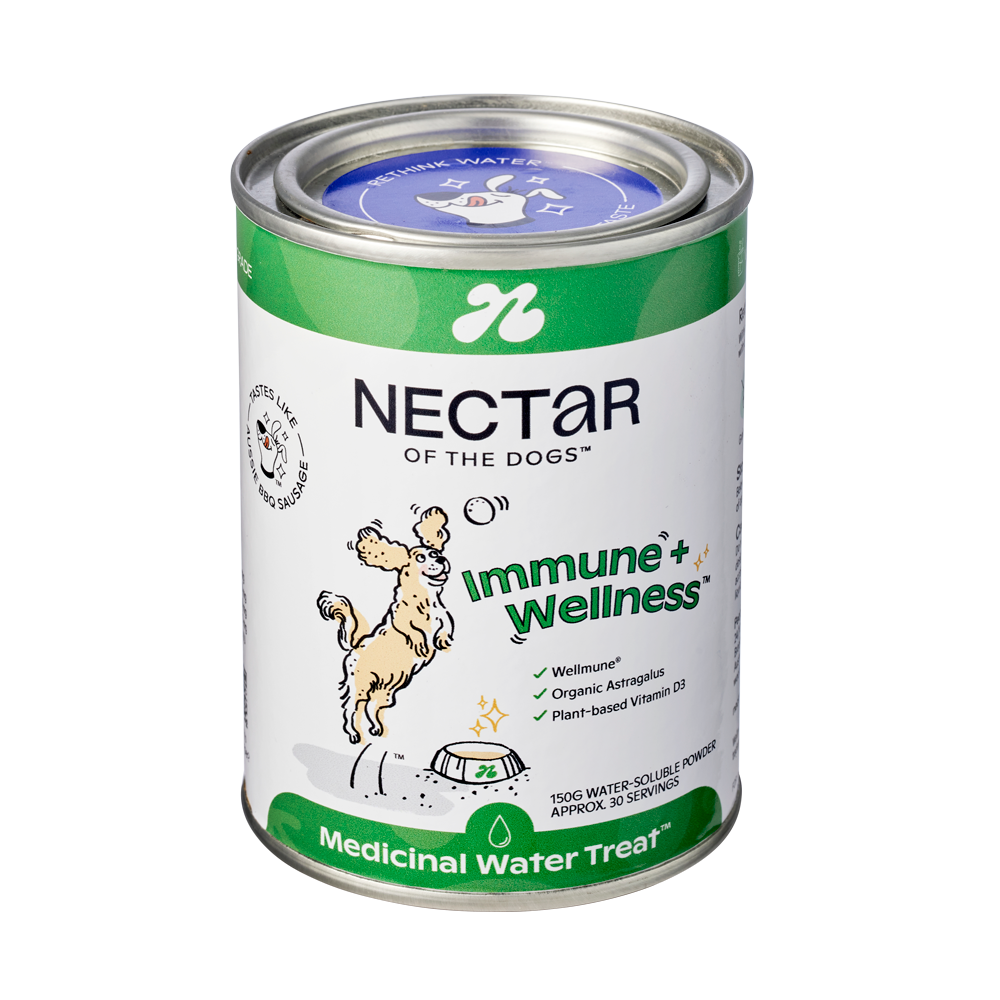Skin allergies in dogs: Decoding food and environmental allergies
Learn more about skin allergies in dogs
It’s a horrible feeling when your dog suffers from skin allergies- especially when you see your best friend in constant discomfort.
Dog parents often attribute allergies with food allergies or food intolerances. Surprisingly though, only 10-15% of allergies are said to be caused by food and environmental allergies are actually much more common.
While it’s important to keep your dog away from any possible allergens, it’s also tricky to narrow down exactly what could be causing the problem.
It is therefore recommended to enrol the help of a veterinarian to diagnose dog allergies - and it often involves a lot of trial and error.
Some of the common allergens your dog might be reacting to include pollen, dust mites, or dander. But then there’s also certain foods that can stimulate skin problems in dogs, as well as other environmental allergens like weeds, grasses and mould.
We’re here to help you better understand your dog’s skin allergies, so you can make their life healthier and happier.

Why do skin allergies in dogs occur?
Similar to us, an allergy in pets is often a misdirected response to a foreign substance (an allergen) by the body’s immune system. But unlike us, when a dog suffers from a seasonal allergy they don’t have watery eyes, a runny nose or sneeze. Instead, these allergies tend to cause a lot of skin issues.
When an allergen is ingested into the body or brushed on the skin, antibodies are produced to protect against the allergen.
These antibodies then circulate through your dog’s body, alerting the immune system and attaching themselves to mast cells to regulate the immune response. Mast cells release histamines which cause the allergic reaction as you’d detect it with the naked eye.
However, these histamines don’t always localise to the problem zone. In fact, they can latch onto the cells anywhere in the body (which is why a chicken allergy can show up as welts on your dog’s stomach).
Most commonly with environmental allergies, histamines will latch onto cells lining your dog’s nose, mouth, eyes, ears, and paws. This can cause them to sneeze, scratch, rub against things and even swell up. Poor little guys!
What is the difference between food and environmental skin allergies?
Broadly speaking, allergies in dogs can fall under two main categories: food and environmental.
- Environmental or seasonal allergies are usually caused by substances from the environment your dog lives in ( home, backyard, park). These allergens are either inhaled or most frequently absorbed into the skin (eg. pollen, dust mites, mould spores) and cause a condition called Atopic Dermatitis. Many dogs also react to the saliva of a flea which then causes a specific type of allergy called flea allergy dermatitis and which is also the most common skin allergy in dogs.
- Food allergies like the name suggests is when your dog reacts to a particular ingredient in their diet. The most common food allergens tend to be protein-based (usually chicken or beef) but can sometimes be carbohydrates (eg. wheat) or artificial ingredients like preservatives.
Although the symptoms between these two types of allergies can be very similar, food allergies tend to also create gastrointestinal issues.

Skin Allergies in Dogs: Causes, Symptoms, Treatment
Causes of environmental dog allergies
The causes of skin allergies in dogs are varied.
The main categories are food, injected allergens, inhaled allergens and contact allergens. They’re pretty straight forward - they refer to allergens your dog would eat, be medicated with, breathe in or come into contact with, say on a walk or around the house.
Any of the above can cause allergies in dogs, so it’s important to be vigilant and notice any new allergens that may have entered your dog’s world.
That said, it’s a common misconception that food allergies represent the largest group of allergies in dogs. Like us humans, dog’s most commonly suffer from environmental allergies - things like pollen and grass that can cause immune responses.
Seasonal allergies cause the most issues for pups, so be sure to take note of the times of year that they suffer the most and try to avoid walking them in areas that might be full of allergens (eg - flower gardens in Spring).
Symptoms of environmental dog allergies
Some of the key symptoms to watch out for are:
- Itching of the skin
- Flaky Skin
- Hot spots
- A strong smell in the ears
- Head shaking and ear scratching
- Excessive licking and biting of the paws
- Respiratory system issue
- Coughing
- Sneezing
- Wheezing
- Runny nose
- Eye mucus
Treatment of environmental dog allergies
- Limit exposure to allergens in the first place by monitoring where you walk your dog and what allergens they come into contact with.
- Vaccinate your pup: Allergy vaccines can help dogs whose owners know exactly what they’re allergic to.
- Ensure your flea treatment is up to date.
- Your veterinarian may prescribe some anti-allergy / antihistamine medication, as well as antibiotics or antifungal medications to help treat possible secondary skin infections. These need to be used carefully as they can also have side effects.
- Wipe them down with a wet cloth after play time outside to limit any allergens that might be on their skin.
- Try a process of elimination diet with the help of your vet whereby you add certain foods you suspect might be causing problems slowly.
- Work with your vet to explore supplements that might support their immune system and enhance their skin health.
Dog Allergy Symptoms: When to See a Vet
Any allergy can be concerning, so it’s always worth talking to your vet to get a second opinion.
Speaking to your vet will also give you a paper trace of when you came in and what the complaints were. This should help you narrow down the allergens your dog is being exposed to.
It may be a good idea to manage the allergy yourself, taking into account things like diet and environmental factors that you can control. Clean, protein-rich meals coupled with a supplement that supports a strong (but not over active) immune system and gut health can also support dogs with allergies.
Check out Nectar’s immune support and gut supplement to see if supplements could be right to support the health of your loved one.














